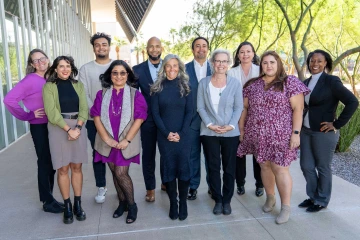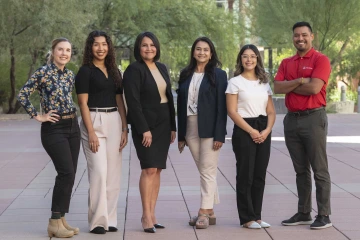U of A medical colleges receive national diversity awards
The University of Arizona College of Medicine – Phoenix and the U of A College of Medicine – Tucson received the Health Professions Higher Education Excellence in Diversity Award from INSIGHT into Diversity magazine. The Health Professions HEED Award is a national honor recognizing U.S. colleges and universities that demonstrate an outstanding commitment to diversity and inclusion.
College of Medicine – Phoenix
Francisco Lucio, JD, senior associate dean at the College of Medicine – Phoenix’s Office of Equity, Diversity and Inclusion, said, “Receiving the HEED Award five times is evidence of the intentional, strategic efforts taken by the college to cultivate a culture of inclusive excellence. We set goals six years ago in our Inclusive Excellence in Health Care Strategic Plan that have yielded great results, and those results are the reasons we have received this national recognition time and again.”
Lucio said one highlight from the past year was launching the medical Spanish program Advancing Medical Inclusivity: Growing Our Spanish Skills, also known as AMIGOSS. The program trains medical students to reach advanced, proficient Spanish-speaking skills to become certified bilingual medical providers.

The College of Medicine – Phoenix’s Office of Equity, Diversity and Inclusion team.
“With a large percentage of patients in Arizona who are monolingual Spanish speakers or prefer health care in Spanish, the AMIGOSS program will help train more physicians to provide language-concordant care, which is important to building patient trust and satisfaction,” Lucio said.
Another success for the college was leading Arizona’s first-ever Black Men in White Coats Youth Summit, where 250 families participated in a daylong series of talks, panels and hands-on activities geared toward encouraging more Black youths to pursue careers in medicine.
The college has big plans ahead, Lucio said.
“This year we will partake in another strategic planning effort to lay out the roadmap for future years,” he said. “We will continue to actively recruit K-12 students underrepresented in medicine through our pathway programs, such as Connect 2 Mentor, Cardiology Academy and our Mobile Medical School Program.
“Each of these programs aims to give mentorship, opportunities and raise awareness of various career paths in medicine. Increasing access to medical school is important, and we will offer more opportunities for students via our Pathway Scholars Program, a Master’s in Medical Sciences program designed to provide a holistic foundation for Arizona premed students to succeed in the rigors of medical school at the College of Medicine – Phoenix.”
Lucio identified Denege Ward-Wright, MD, associate chair for justice, equity, diversity and inclusion in the Department of Internal Medicine, as a key champion for the college’s strategic goals.
“This year, Dr. Ward-Wright led the successful creation of the department’s first-ever Health Equity Conference, which focused on better serving the unhoused, those suffering from substance use disorders and more,” Lucio said.
College of Medicine – Tucson
Celia Valenzuela, MD, vice dean of access, community and belonging at the College of Medicine – Tucson (previously known as the Office of Diversity, Equity and Inclusion), said receiving the HEED Award, a first for the college, is a tremendous honor.
“This prestigious national award recognizes our college’s commitment to fostering an inclusive environment where every individual is valued, respected and empowered to thrive,” Valenzuela said. “It acknowledges the collaborative efforts we’ve made throughout the college and highlights our continued dedication to training a diverse physician and research workforce focused on improving health outcomes for all.”
The college had several diversity, equity and inclusion successes in the past year, Valenzuela said.

The College of Medicine – Tucson’s Access, Community and Belonging team.
“We created a graduate medical education diversity toolkit to guide our residency and fellowship programs,” she said. “This toolkit provides resources to help diversify our applicant pools and outlines essential steps for taking a holistic approach to evaluating applicants.”
The college also successfully concluded the inaugural year of its Women in Medicine Fellowship, a 12-month program dedicated to empowering women physicians and scientists with the skills necessary to thrive in leadership roles.
“In collaboration with our Diversity Champions, we additionally established a foundation for restorative practices, which will serve as a means to address and mitigate harm that occurs within our learning and working environments,” Valenzuela said.
Looking toward 2025, the college’s plans include developing programming to address the shortage of Native American physicians in Arizona’s tribal communities.
“With a focus on building and strengthening pathways and capacity-building initiatives through cultural exchange, we aim to recruit, retain and support Native American students throughout their journey — from tribal high schools to a bachelor of science in medicine, physiology or medical sciences, and into our MD program — ultimately guiding them into residency programs at the College of Medicine – Tucson,” she said. “We will additionally focus on community building through restorative practices and initiatives that foster connections among individuals across the college.”
Valenzuela highlighted Lourdes Castañón, MD, and Kristopher J. Abbate, MD, as two college faculty members who are advancing the college’s DEI goals. Both also received Excellence in DEI Awards at the college’s faculty awards ceremony this year.
“Dr. Castañón recently served as the chair for the Faculty Diversity Advisory Committee and is the Department of Surgery DEI champion. She has served as the faculty advisor to the association of women’s surgeons, the Latino Medical Student Association and the first-generation low-income student association,” Valenzuela said. “Through these roles, she has provided guidance, support and mentoring to aspiring professionals from diverse backgrounds, empowering them to overcome barriers and achieve their full potential.”
Valenzuela said Abatte has consistently made significant contributions to advocate for quality, evidence-based health care regardless of gender or sexual orientation.
“He has worked to incorporate training on LGBTQ issues into the undergraduate medical education curriculum and advance preventative health resources for vulnerable communities,” Valenzuela said. “Dr. Abbate is the founder and medical director for the LGBTQ youth program. His work has strengthened the overall climate of inclusion at the College of Medicine – Tucson.”

